the great lockdown
absorbing
social cooling is as damaging to human society as global warming is to the environment. as we grow more connected, we’re growing less adventurous, creative, free, obtuse, human. mark hurst wrote about the surveillance complex: about how amazon and the american police joined-hands to cool anti-racism protests ; how big-tech’s surveillance capitalism has greater domain, reach and power than what any state — hello china! — does ; and how turning afghanistan into a panopticon did not make it happier, healthier or more secure.
hurst’s essay on why he’s losing faith in ux design: ux lacks a spine, and has grown diminished to become a lure on a corporate anglerfish. rohit sharma shared a supplementary thread discussing a monicker for dark patterns in ux design. alexis lloyd wrote how, as the world grows increasingly complex, the limitations of user-centred design result in the obscuring (and redistribution) of possibilities, friction, and participants. stumbled on ralph ammer’s essay, make me think, which encourages designers to embrace complexity and discourages them from trivialising people as ‘users’.
considered the role of art as dissent against the havoc wreaked by myopic big-tech, consumerism and capitalism. varun grover described the intended function of comedy (jesters) as a formal mechanism of dissent under a monarchy (cf. he operates as a comic in india’s perverse democracy) : design and tech don’t have any such mechanisms.
besides dissent, i’d like my practice to operate somewhere between thijs bierksteker’s art that brings facts to life and superflux’s design that helps us imagine different futures.
the eliza effect on 99%i: on making artificial intelligences that mirror humans ; from joseph weizenbaum’s pessimistic turnaround after writing eliza (after the 1960s) to allison darcy’s cautious optimism for woebot (in the 2010s).
the turing test is obsolete — but calling it obsolete means that it was probably relevant at some point, and i think that it has always been problematic and should never have been a thing. this probably fed into my essay against impressive technologies.
Are You Developing Skills That Won’t Be Automated? (2019): “Our ability to manage and utilize emotion and to take into account the effects of context are key ingredients of critical thinking, creative problem solving, effective communication, adaptive learning, and good judgment. It has proven very difficult to program machines to emulate such human knowledge and skills, and it is not clear when (or whether) today’s fledgling efforts to do so will bear fruit.”
the effect of identity design can either be to set one apart (think matrix’s red dress), or help one fit in (black tuxedos). sadly, a lot of graphic designers interpret the intended effect as the design process instead. the process of design should always be in-to-out — if you find yourself looking at competitors and relying heavily on ‘secondary studies’, check yourself, introspect, work to establish your own values, and then design outward from there. values can be identified by reference (looking at those we admire and wish to emulate), but design itself should not happen by reference.
kshitiz, who i’d first met at codesign, introduced me to fs: how the representation of something (its map) is not the thing (the territory) itself. this led me to an article on how redundancy, meant to avoid catastrophe, can actually cause failure.
i think francisco laranjo is suggesting ‘speculative design’ be declared dead because our learnings and values from it should now apply to all of design (and design education).
in an interview, simone rabaudengo suggested making not-so-intelligent intelligent things ; (i think) technology seduces us with convenience and robs us of agency ; algorithms are great, but they’re toxic if they render us lazy, disinformed, socially cooled, and essentially unintelligent. and: while there’s much to align with andrew allen’s early writings for andy.works, i’m happy to dwell on “want better, not more apps” for now.
attended julian bleecker’s ‘office hours’ sessions (subscribe) and read his design fiction newsletter. tellart put up a nice series of design non-fiction videos on the future of the design practice — emphasising “the timeless need to make the invisible visible and the immaterial tangible, in order to sketch and build with emerging technologies”.
this is what i thought when i skimmed-through caroline sinders’s defense of usefulness for art and design: “fuck design thinking and the mechanisation of empathy ; design is hollow without a critical lens or moral compass ; before i can be a good designer, i need to learn how to make art.”
the value of diminished reality over some of the mindless trends in augmented / virtual reality today.
“we all know that our work as consultants is largely useless”, a(n increasingly distant) friend bearing iit, iim and bain credentials said ; off the record, of-course. “we get paid because our clients are clueless and we sound confident ; we engage for too short a time to really do good work.”
aljazeera: the complexities of the global response to the covid19 pandemic.
work
started slowstudio.
wrote: “for all its focus on human-centred solution-making, design seems to have overwhelmingly belittled humans (as “users”), dwindled experiences (into screens) and devised insidious solutions (packaged as invasive snoopy dopamine bursts). slow is a space, then, to think differently about such things: ‘thinking’ through prototyping, communicating and experiencing the future that we’d like to see.”
invited applicants, to join me, with a typewritten advert:
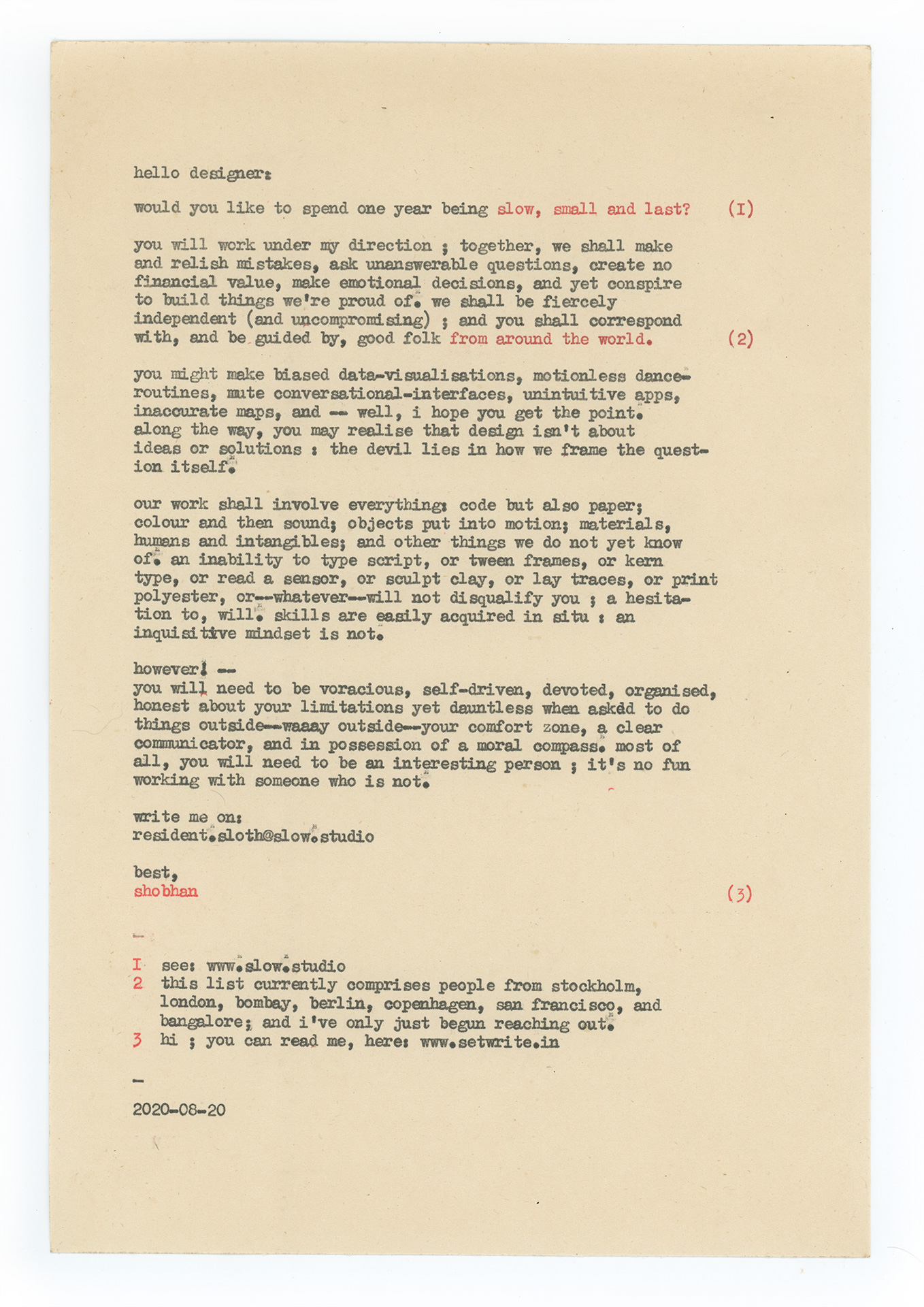
explored data visualisations with rohit. we returned to the iraqbodycount dataset to imagine it for the screen. also tried to visualise the spread of covid19, but data about india’s demographics and infections was difficult to reliably source, and in the end i left the explorations incomplete.
turned data into sculptures with håkan (rumtiden); had inputs from jörgen abrahamsson and mikael forth along the way.
brought conversational ideas and (some) performance to app-design when consulting tata classedge. i don’t enjoy screen-led work much, but shekhar created a safe-space for me within the organisation and let my mind feast on some thoroughly difficult enjoyable problems. when invited to art-direct some work, tried to impart a love for the sea (instead of delegating tasks). the tata engagement was curtailed, though, when mcd pulled me in, and let me look at voice-led interactions through unconventional lenses like silence and motion. observed dispassionate consultants produce poor work, bleeding coffers and lowering morale, in multiple corporate environments.
helped tidy cmf’s website so that dyslexic children can be proud of the work they produce.
also did some graphic design for nitin sawhney’s album, “immigrants”.
oppression and depression
was otherised as an “intellectual” and not allowed to speak against the religious and misogynic dogma that pervade hindu marriage rituals ; silenced thus, i couldn’t encourage people to respect social distancing norms (or even respect a girl’s wishes for her own marriage wedding proceedings). it was so easy for someone to suppress me physically and intellectually by simply being larger and louder (even though they were not malicious, or even conscious, of what they were doing).
i guess this is symptomatic of the state of most things in the world right now: bellows of myopic chauvinism routinely drown-out earnest egalitarian voices in politics, religion, economics, design, environment, gender, et cetera.
read: the financial burden of indian weddings ; period shaming in india must end ; indian women are forced to isloate when they menstruate ; men and religions control women’s bodies by barring entry to kitchens or temples, but even indian’s supreme court has been unable to stand its ground against this ; on gender policing, because rape is not always about sex. somewhat related: sita sings the blues, of-course. unrelated, but not totally: korea’s spycams and a pop-star’s suicide.
the opportunity cost of birth
when i was looking for work in stockholm, mckinsey-design refused to interview me for a design-consultant role. their reason?: indians can’t indulge in “short-notice travel”, and so—i guess—don’t sit well in roles that involve conversations with globally-dispersed clients. now, i am confident that mckinsey could’ve easily secured a few tactical travel-permits so that my passport didn’t interfere with my work for them ; so, the unapologetic manner in which they rejected me hit me hard. those in positions of privilege give very little consideration to how frivolously they dismiss us; they stunt our lives and careers; and restrict our access to the best roles in their machinery.
(ironically, the pandemic reared its head in the week following their email: the person hired instead of me would’ve ended up working remotely through the pandemic, wouldn’t they?)
then, after two heartwarming interviews and lots of positivity, i found work as a creative technologist with akqa in venice. tomes of italian immigration paperwork (and india’s bureaucratic black-holes) kept me from moving to italy in time ; eventually, the pandemic drained economies and expunged all unfilled job-positions, leaving me stranded in bombay.
finally: as part of cost-saving measures (it is rumoured), a corporation decided to terminate all contractors who weren’t based in its home country — since i was working for them remotely (from india) in the pandemic, i was gracefully evicted from a work-domain that i’d pursued for three years across three continents.
travel (!)
visited milan, como and hampi just before the world locked-down.
i am not fond of bombay, but i recognised the need to lay down an emotional anchor here ; early in 2021, i began to travel into eyes, infatuations, conversations, cafés and forests ; wondered: “if i fell in love with the people in it, perhaps the place wouldn’t seem as bad?”
soumitra told me about a birding area in bombay’s eastern suburbs. walked into a mangrove forest ; it was littered with all the garbage that bombay dumps into its sea ; it was also an incredibly quiet place, where we could walk and converse for hours without seeing a single soul.
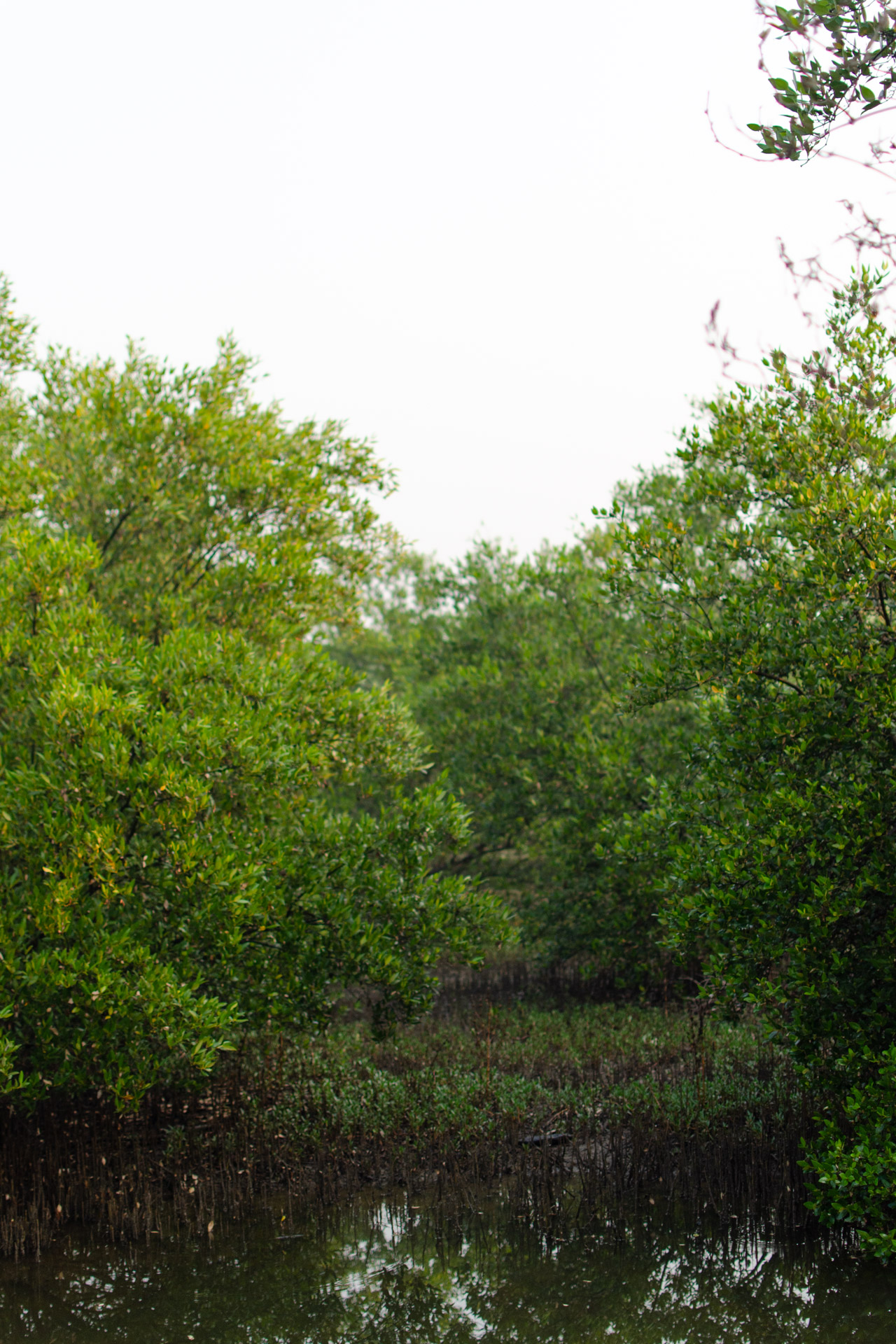
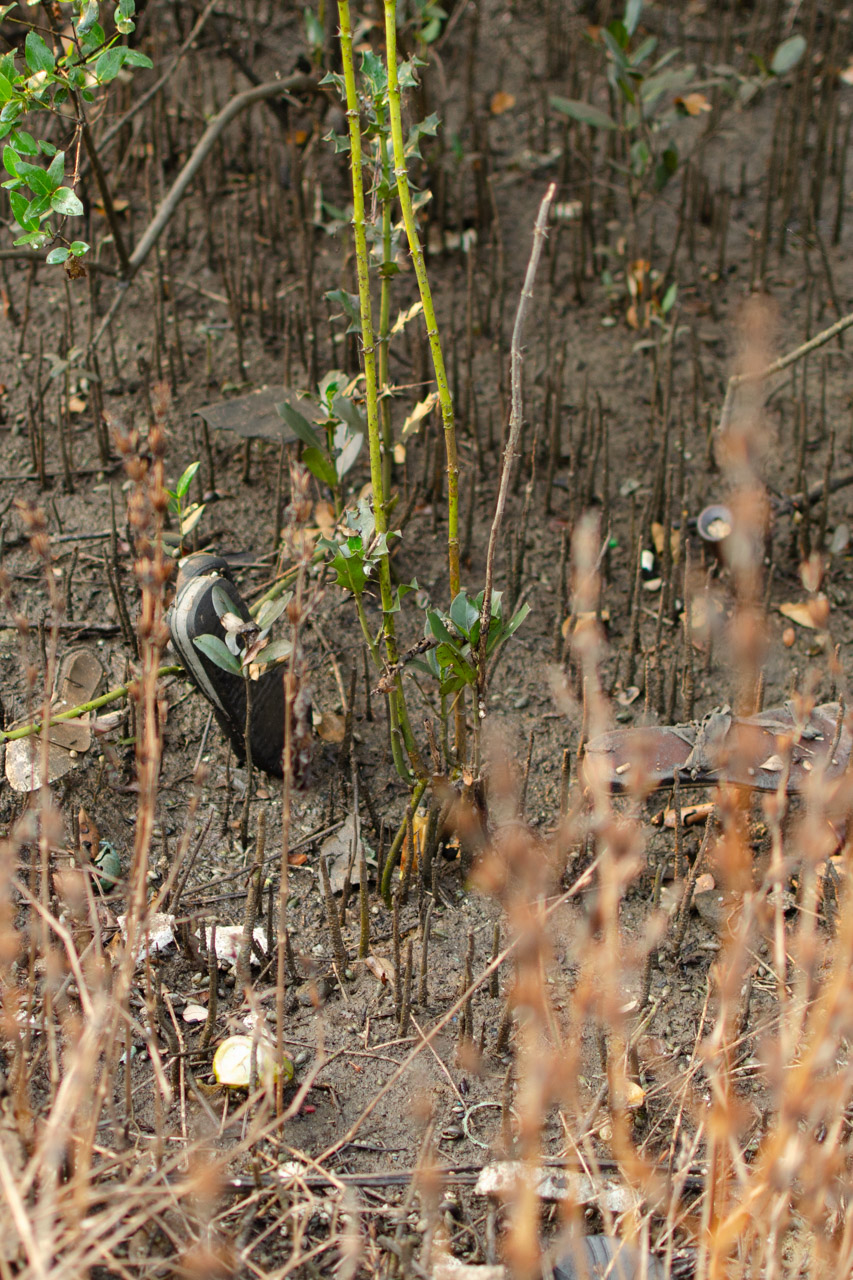
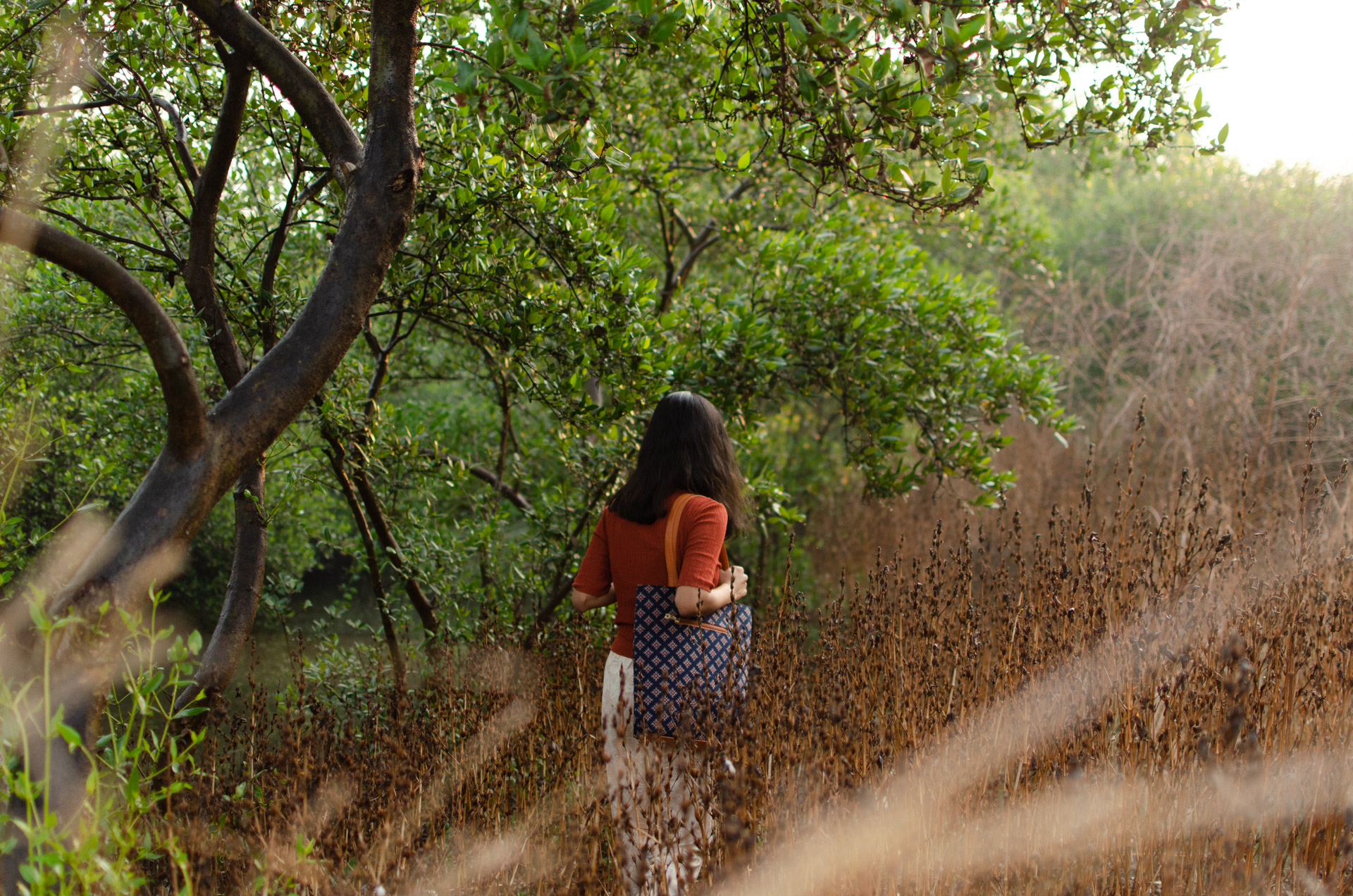
heard this during vivek madan’s riveting performance of every brilliant thing at prithvi theatre: “if you live a long life and never once feel crushingly depressed, you haven’t been paying attention.” besides reintroducing me to the world of theatre, nitya helped me grow out of my long-standing prejudices against nudity in acting.
met a strange person: i learned how child abuse is a real thing, and felt small when she shared stories about the people she chose to forgive. gifted her unthinkable, so that she never feels apologetic for the scars the past left on her mind ; and then we said goodbye.
wrote this:
and so she was gone,
as sudden as she came ;
a breath of fresh air,
or a speeding train.
family
identified how a lack of space fuelled tensions in a busy household ; quickly moved to secure larger space, greater privacy, and a pleasant view. argued that living as tenants in a spacious apartment is more important than living in our own, albeit cosy, home.
had to teach a carpenter to make and use a plumb-line ; was unhappy with his workmanship, and bought a power-drill ; taught my eight-year-old niece to use it. she used the drill with aplomb, but then cut her finger on my typewriter. so i taught her some basic first-aid.
made a toilet-paper birthday card.
encouraged the family to step out (responsibly) onto beaches and go on socially-distanced trips together. the sister got married to a gorgeous fellow (inside and out).
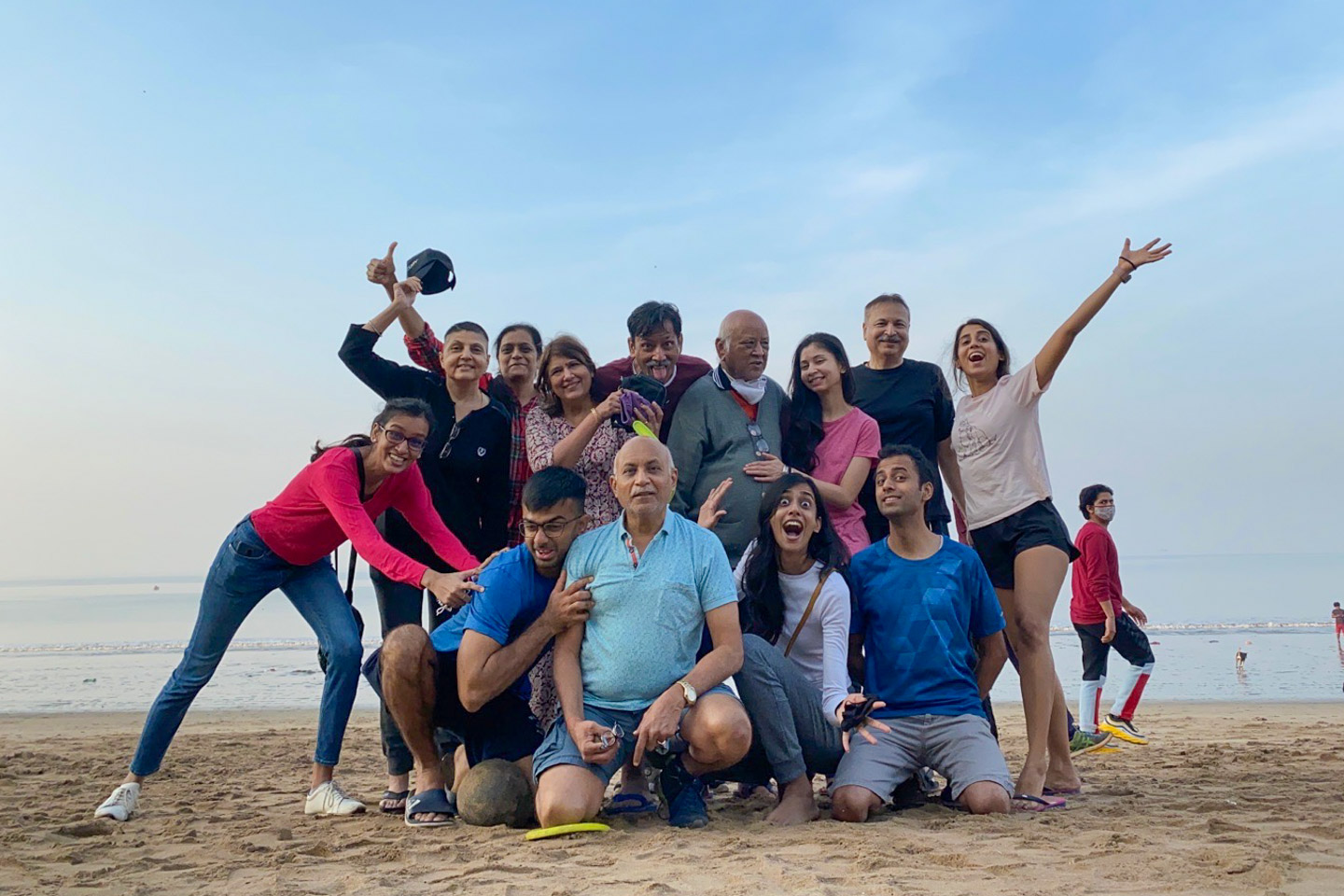

image credit: a photographer named pranjal.
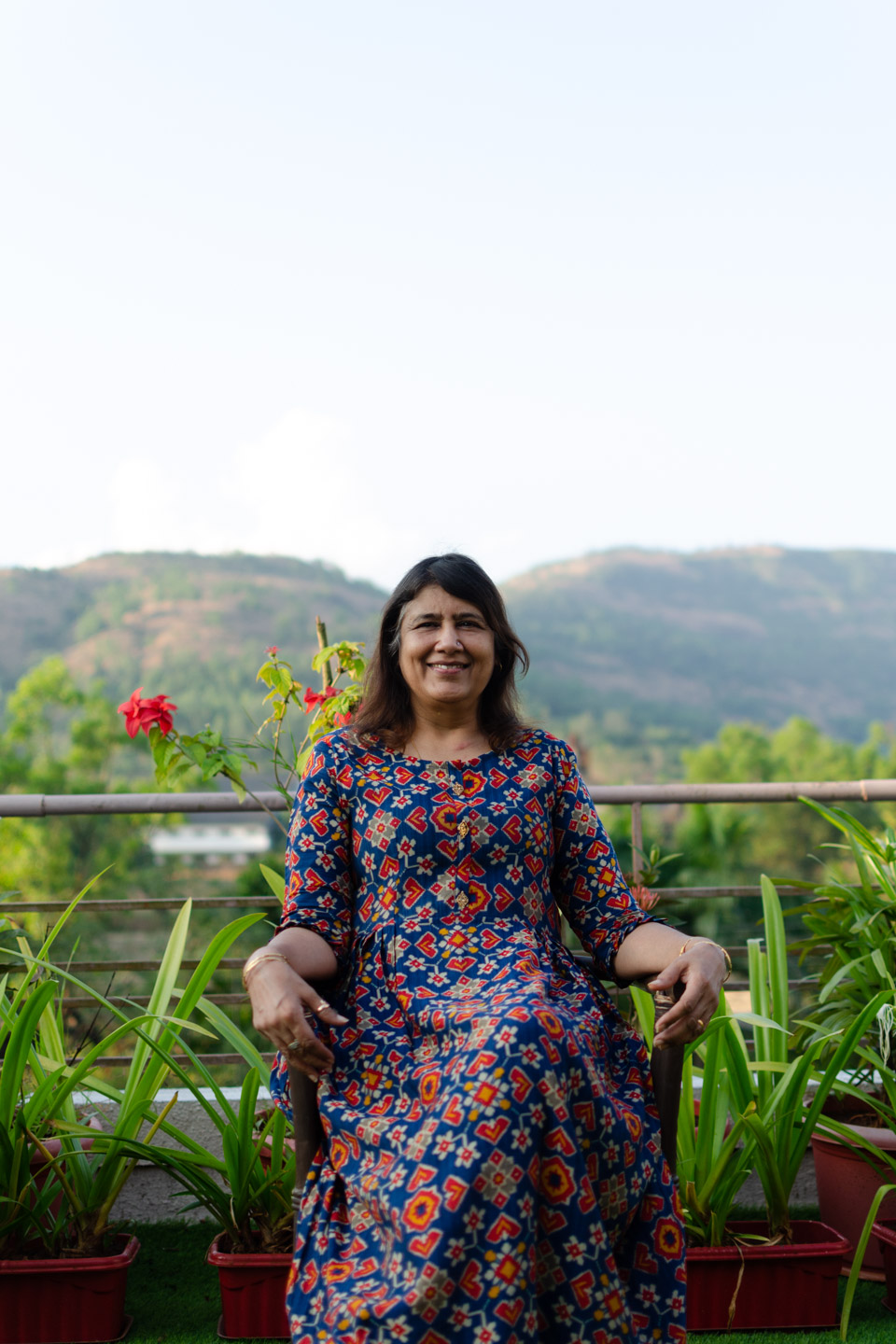
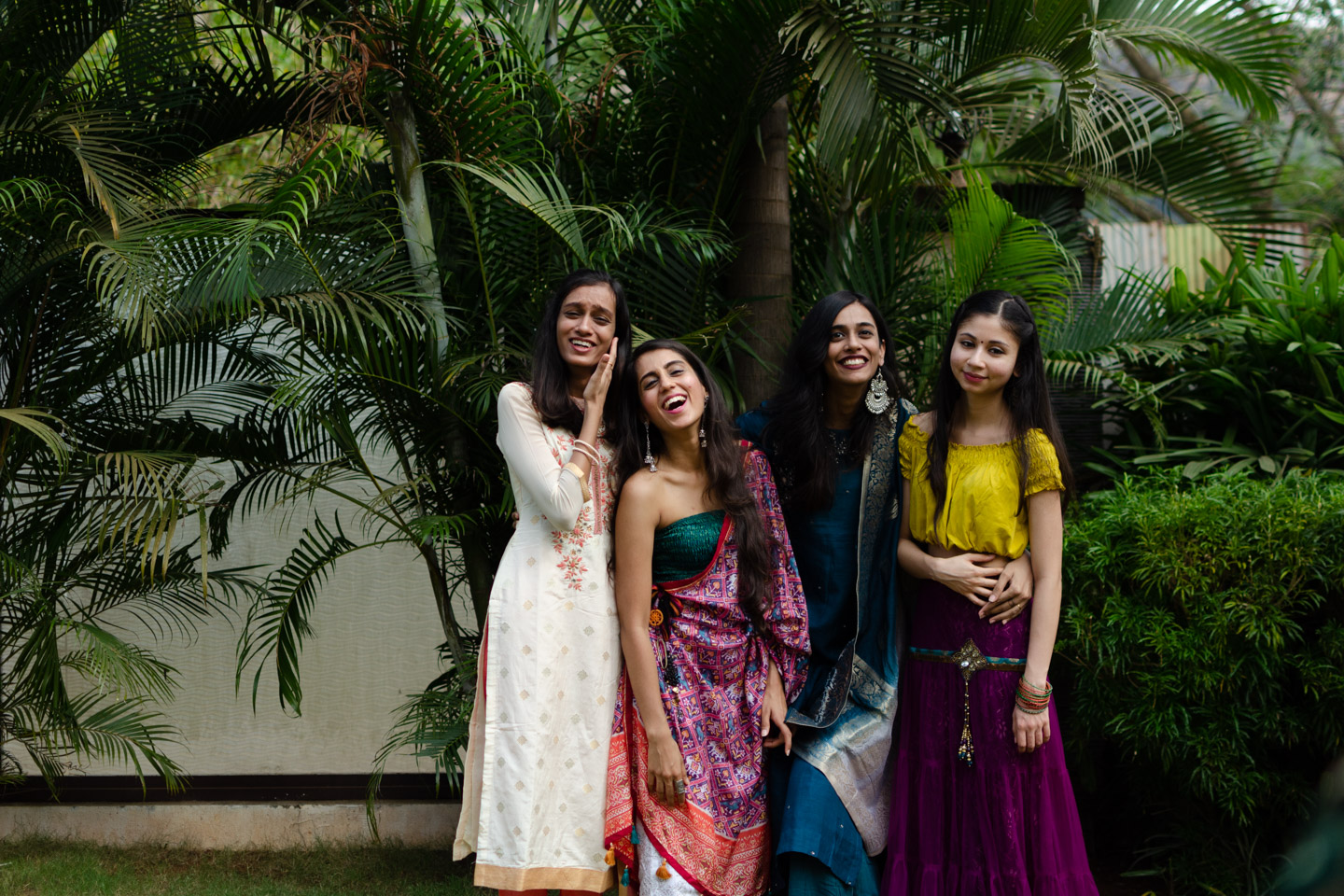
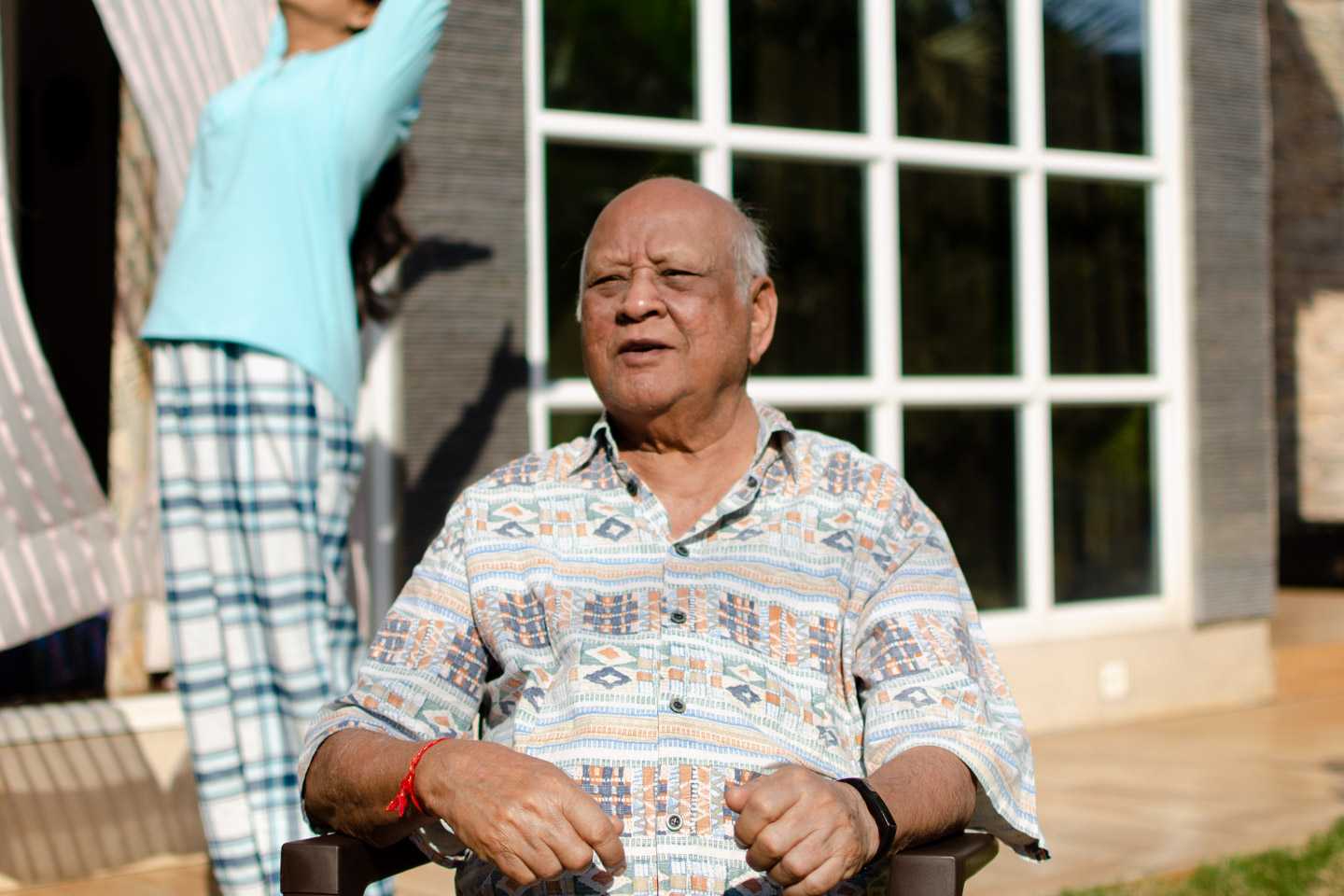
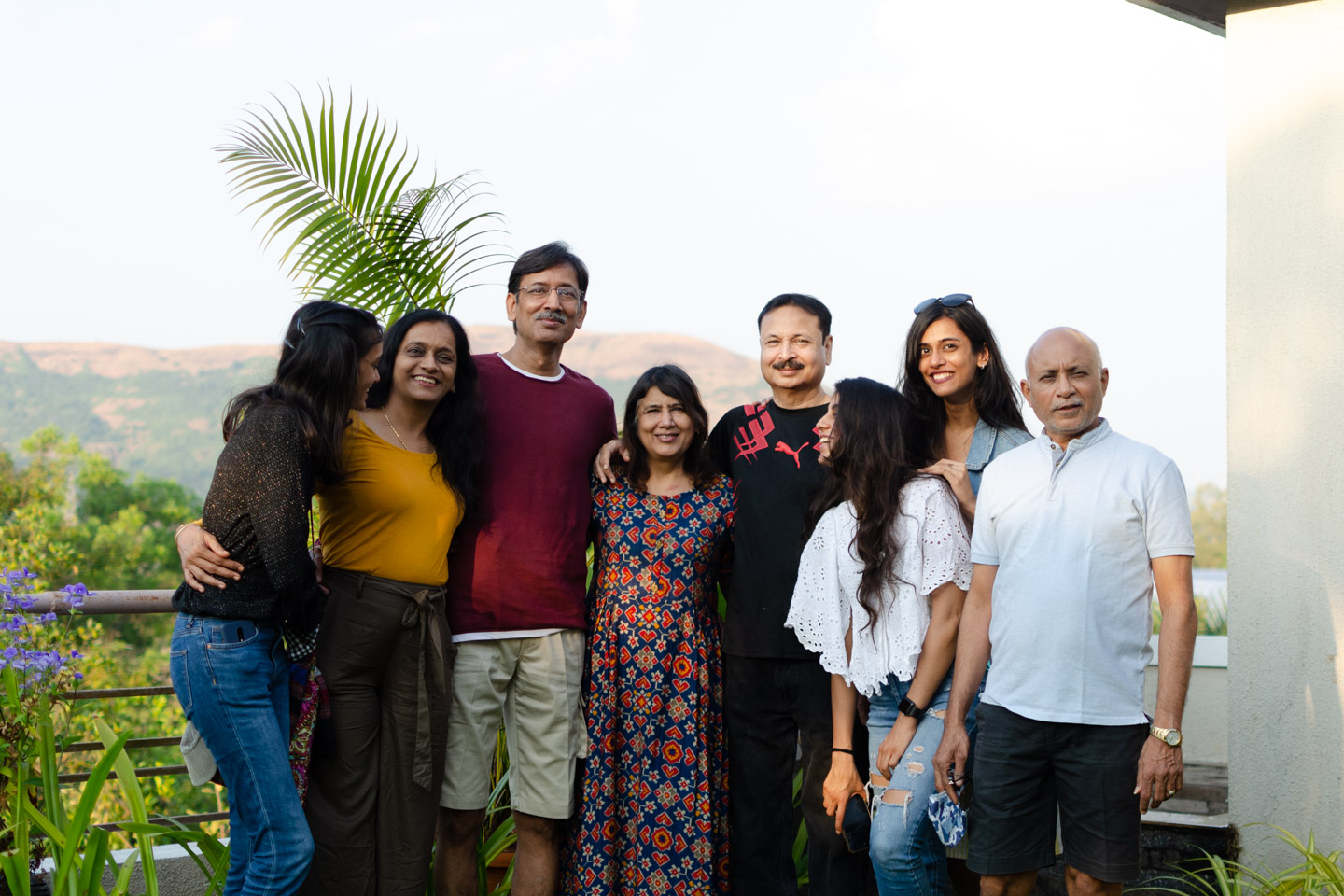


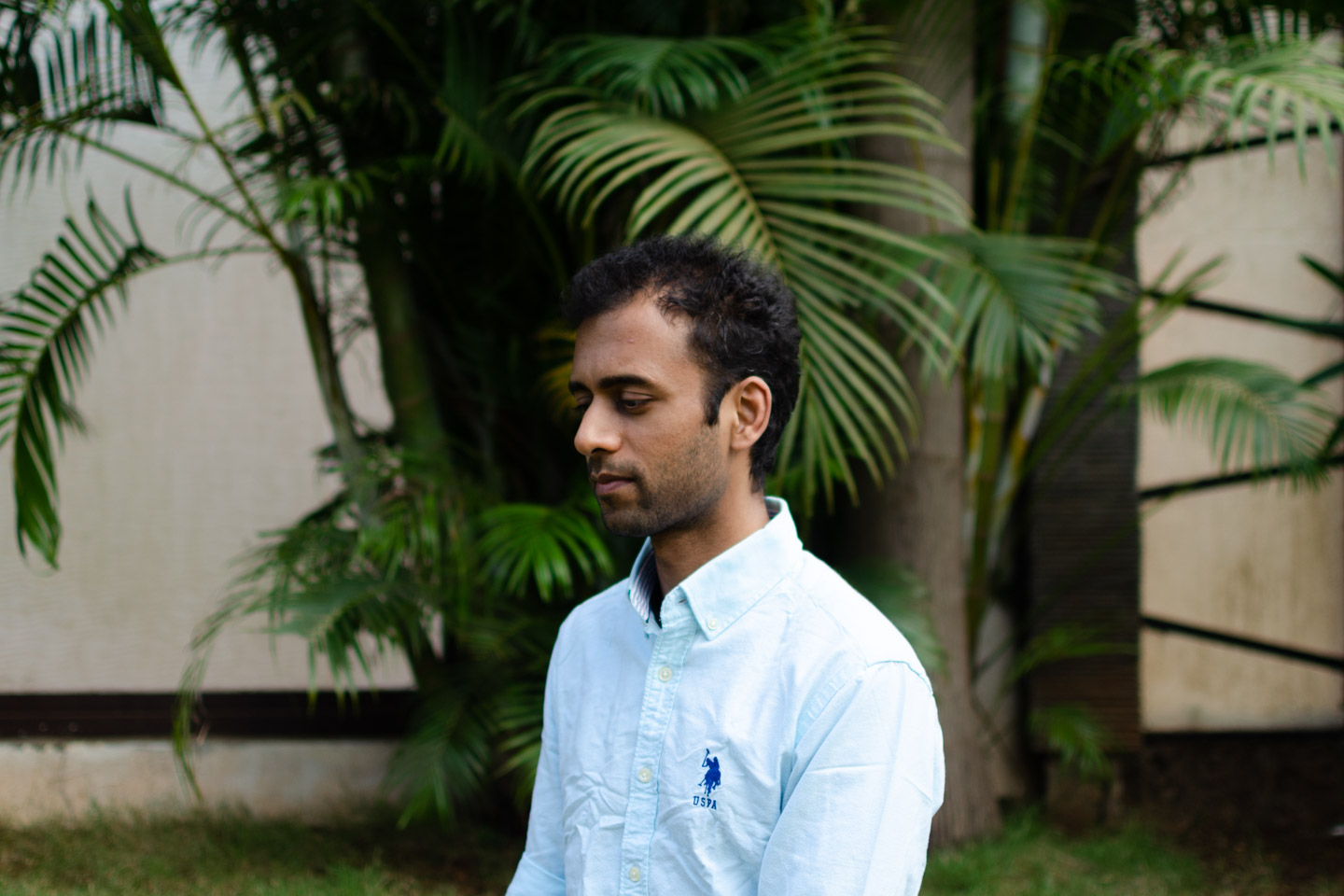
among other things
in december, dahiya felt, disapprovingly, that i was working toward comfort, and that he expected better of me. in an (unrelated) chat, i realised that akshay verma (who was exploring collective ownership while setting up prophecy) admired precisely those facets of my work that i am generally insecure about. so i resolved to use 2021 to discover discomfort again, and embrace my insecurities instead of running from them.
observed the creep of mask classism: where people of wealth and privilege refused to wear masks while admonishing the poor and blue-collared to don them. the impoverished were stigmatised (and controlled) for the spread of an unprejudiced contagion. worse: in mere months, i noted a growing belief among the poor that they were, indeed, more to blame for the virus’s spread than their paymasters were.
chourouk got back in touch, and helped me appreciate how “it’s actually really easy to be nice”.
continued donating to wikipedia.
—